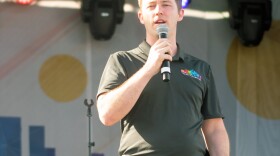Kentucky high schools aren't the most inviting spaces for LGBT students, according to a study released this week by the Gay, Lesbian and Straight Education Network, or GLSEN.
Ninty-seven percent of Kentucky respondents have heard the term “gay” used in a negative way, according to the National School Climate Survey. Just less than that, 93 percent, said they have heard other homophobic remarks in a Kentucky high school.
Nationally, 65 percent of LGBT students reported hearing homophobic remarks during the school day.
Despite Kentucky's higher, GLSEN senior research associate Neal Palmer said the state is “fairly similar” to the rest of the country in school climate for LGBT students.
More than 7,800 lesbian, gay, bisexual and transgender students responded to the survey, now in its eighth year.
Here are some other findings from the survey:
- 34 percent of Kentucky respondents said they heard homophobic remarks from school staff.
- 33 percent regularly heard school staff make negative remarks about a student’s gender expression.
- 47 percent of LGBT respondents were physically harassed because of their sexual orientation.
- 27 percent were physically assaulted because of their gender orientation.
- 77 percent were verbally harassed based on their sexual orientation.
- 92 percent of Kentucky LGBT respondents said they feel deliberately excluded or “left out” by peers
- 64 percent experienced electronic harassment and “cyberbullying.”
- 67 percent have been sexually harassed.
- 56 percent had property deliberately damaged.
The survey results are distressing, Palmer said, but GLSEN is seeing decreases in the prevalence of negative language being heard at schools and in occurrences of harassment.
He said these decreases can be attributed, in part, to increased numbers of resources—like Gay-Straight Alliances—at schools in Kentucky and around the U.S.
“Students at those schools tend to have much better experiences,” he said.
In Kentucky, 23 percent of respondents said they attended a school with a Gay-Straight Alliance or similar student club at their school.
Palmer said there can be challenges to developing these types of groups.
“For the longest time, they were seen as controversial or disruptive,” he said, adding that that's changing because students are beginning to assert their right to form such clubs in schools, he said.
Jon Akers, the executive director of Kentucky Center for School Safety, said his office works to ensure every student is safe in Kentucky schools. But he said LGBT students are at high-risk for bullying and discrimination.
He said his office focuses on “policies and procedures that school officials could use” to address issues like bullying of LGBT students.
Just 5 percent of Kentucky respondents to the National School Climate Survey said they attended a school with an anti-bullying policy that includes specific protections for sexual orientation and gender identity.
Earlier this year, Atherton High School in Louisville developed a comprehensive anti-discrimination policy that now includes transgender students.
Only schools can decide whether to include specific language for LGBT students in anti-discrimination policies and anti-bullying policies, Akers said.
But he said his office strives to make sure that LGBT students—and every other student—is comfortable in school.
“Every child walks in to that school building has an absolute right to walk that school free of any type of harassment and be given all the privileges and services we can provide to have that child succeed in life,” he said.






